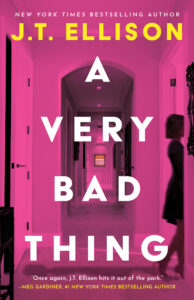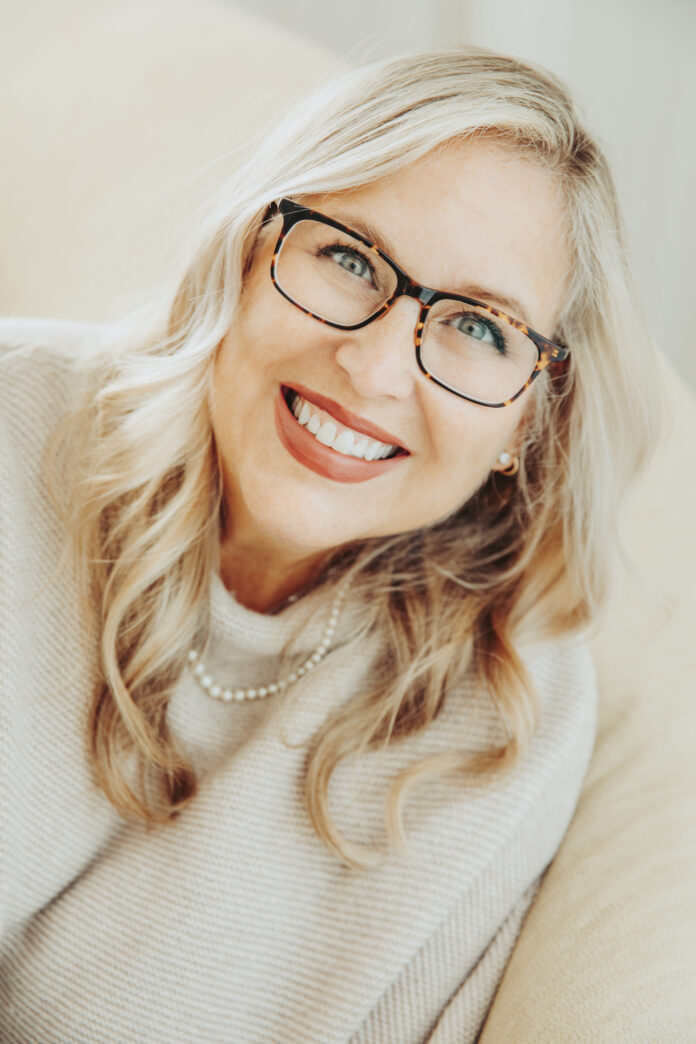Welcome to the blog T.J. Our readers can’t wait to hear more about your latest release A VERY BAD THING.Let’s begin with what inspired you to write A VERY BAD THING?
Ironically, it was a conversation with one of my dear friends, bookseller Barbara Peters, owner of the Poisoned Pen Bookstore in Scottsdale. We were talking about Agatha Christie, and she told me she’d visited her house once. Her description of the interior was fascinating, and a story idea hit me like a lightning bolt—a young woman inheriting the home of an author who’d died under mysterious circumstances. As happens with nascent ideas, they grow and change and morph, and the end result doesn’t resemble this original idea in anything but spirit. Happily, though, I’m using those first concepts to write another story that is more in line with the original plot idea. It’s a rich tapestry to work from.
How did you choose the novel’s title?
I love titling books—they’re either literal or metaphorical, and this one is so literal. The book’s prologue is a letter from a mother to her daughter, a posthumous admission of guilt, and the second line is: “Many, many years ago, I did a very bad thing.” It gave me chills when I wrote it. It had all the elements of a great title. Happily, everyone agreed. Sometimes, hitting on the perfect title is a lot more challenging, but we got this one right away.
What inspired you to start writing novels?
I’ve always been a huge reader and was allowed to read anything I could reach on my parents’ bookshelves. (Happily, I was a tall kid, so I got exposed to some incredibly sophisticated work very early). From a very young age, I wrote poems and little short stories. My mom’s Norton Anthology of Poetry was my favorite book, and when I was eight or so, I remember reading Alfred, Lord Tennyson’s The Eagle, and realizing how magnificent it was, how these deceptively simple few lines were packed with metaphor. The concept clicked, and from that moment on, I was compelled to play with words. But the leap to novels didn’t happen until I was older and had some life experience to share. I had a much broader reading palate and a keen desire to try my hand at the form I’d fallen in love with as an adult: Crime fiction.
What are some recurring themes in your work?
My core theme is very straightforward: I love stories about women finding their power and place in the world, and almost every book I’ve ever written has a variation of this theme. I’m also a huge fan of mythology, so my books often have elements of these origin stories. I’m also interested in how we as a society function in a highly curated world. How much can be believed about the people we think we know? What might the real story be? And finally, justice for those who can’t get it for themselves. A college friend of mine (Dail Dinwiddie) went missing in 1992. She disappeared after a U2 concert in Columbia, South Carolina, and I think every story has that sense of dislocation and loss at its heart.
What about domestic suspense as a genre appeals to you as an author?
I spent many years writing stories where a law enforcement officer knocks on someone’s door to share terrible news. Those stories are fascinating, but the more I wrote, the more I realized what really intrigues me is the Janus twin: What happens inside that house, on the other side of the door, when the bad news is received? How does it break a family? What sort of cracks were visible—and invisible—before this tragic event? What set it in motion? Who, if anyone, is at fault? And of course, how well do we really know the people we love? What secrets are they hiding? (I’m a lot of fun at dinner parties, putting these ideas in people’s heads, I’ll tell you that.)
What advice do you have for new writers?
Every successful author I know is a huge reader. Read everything you can get your hands on in every genre—the one you’re writing in, yes, but also all the popular novels, classics, diverse voices, even stories that seem entirely out of your wheelhouse. You will get a masterclass on how to do your job and broaden your horizons.
And when you start writing, find a schedule and stick to it. If you respect your creative time, the people around you will learn to respect it as well.
Thank you so much for joining us today. Readers, T.J.’s book just released. Here’s a quick look at A VERY BAD THING:
 From New York Times bestselling author J.T. Ellison comes a taut thriller about one author at the pinnacle of her career, whose past threatens to destroy everything she has—and everyone she knows.
From New York Times bestselling author J.T. Ellison comes a taut thriller about one author at the pinnacle of her career, whose past threatens to destroy everything she has—and everyone she knows.
A great writer knows when to deliver a juicy plot twist. But for one author, the biggest twist of all is her own murder.
With a number of hit titles and a highly anticipated movie tie-in, celebrated novelist Columbia Jones is at the top of her game. Fans around the world adore her. But on the final night of her latest book tour, one face in the crowd makes the author collapse. And by the next morning, she’s lying dead in a pool of blood.
Columbia’s death shocks the world and leaves Darian, her daughter and publicist, reeling. The police have nothing to go on—at first. But then details emerge, pointing to the author’s illicit past. Turns out many people had motive to kill Columbia. And with a hungry reporter and frustrated cop on the trail, her secrets won’t stay buried long. But how many lives will they shatter as the truth comes out?






